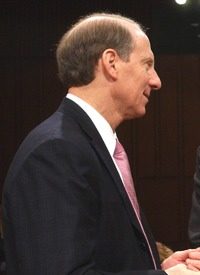
Council on Foreign Relations President Richard Haass has penned a cover story for Newsweek magazine calling for a smaller U.S. presence in Afghanistan, but not complete withdrawal.
The article, “Rethinking Afghanistan: We’re not winning, It’s not worth it," concludes that:
The war the United States is now fighting in Afghanistan is not succeeding and is not worth waging in this way. The time has come to scale back U.S. objectives and sharply reduce U.S. involvement on the ground. Afghanistan is claiming too many American lives, requiring too much attention, and absorbing too many resources. The sooner we accept that Afghanistan is less a problem to be fixed than a situation to be managed, the better.
The initial rationale for the war — taking out al-Qaeda for its attacks on the United States on September 11, 2001 — has largely been accomplished. “There’s hardly any al Qaeda left there,” Haass told MSNBC’s Morning Joe program. “Leon Panetta spoke the other day and said there is only between roughly 50 and 100 al Qaeda inside Afghanistan. That’s not worth 100,000 American soldiers.”
Haass’ basic argument is that Obama is losing the war that the Bush administration managed poorly. He argues, “After nearly nine years of war, however, continued or increased U.S. involvement in Afghanistan isn’t likely to yield lasting improvements that would be commensurate in any way with the investment of American blood and treasure. It is time to scale down our ambitions there and both reduce and redirect what we do.”
“The idea that we’re going to create a strong successful central government goes against the entire grain of Afghan history,” Haass said of Obama’s policy on Morning Joe, adding that the ethnic make-up of Afghanistan means that “it’s inevitable that the Taliban will reestablish some footholds. I don’t like that, but I don’t think that’s worth American lives, so long as the Taliban does not bring back al Qaeda.”
That’s not to say that al-Qaeda will regain a foothold in Afghanistan. “What the President has basically said any return of the Taliban is the same as a return of al Qaeda,” Haass told Morning Joe’s Mika Brzezinski “And I said that’s not true. Let’s test that proposition.”
Haass is sharply critical of the Obama administration policy, event though he reveals in the Newsweek article that he floated a similar proposal as an official in the Bush administration:
The Bush administration was less clear on what to do next. Working in the State Department at the time, I was appointed by President Bush as the U.S. government’s coordinator for the future of Afghanistan. At a National Security Council meeting chaired by the president in October 2001, I was the one arguing that once the Taliban were removed from power there might be a short-lived opportunity to help establish a weak but functional Afghan state. There and at subsequent meetings I pressed for a U.S. military presence of some 25,000–30,000 troops (matched by an equal number from NATO countries) to be part of an international force that would help maintain order after the invasion and train Afghans until they could protect themselves.
Haass told Morning Joe that “the previous administration — right or wrong — essentially said that we’re only going to go after al Qaeda there. We’re not going to get ambitious in Afghanistan. Mr. Obama however, chose an entirely different path. He said this is truly important. This is central to the war on terror even though there are hardly any al Qaeda left there. He said this is central to the future of Pakistan, even though I think what happens in Pakistan is far more important to its future than anything that happens to Afghanistan.”
The essential argument Haass is making is not that American soldiers’ lives are too valuable, or even that nation-building is a bad thing. To the contrary, Haass is President of the interventionist-minded Council on Foreign Relations and has floated nation-building proposals himself from time to time. Rather, Haass is concerned that the political capital — the willingness of the American people to allow their politicians to keep getting soldiers killed in foreign wars — is being used up in the Afghan war.
That’s why Haass told Mika Brzezinski that increased intervention in Afghanistan was a mistake, adding: "I don’t think it’s worth the investment. I’m much more concerned about developments in Iran or North Korea.”
Haass doesn’t argue that the lives of American soldiers are too precious to be thrown away on senseless foreign wars, but that they should be killed in a greater variety of foreign wars. His primary concern is that the Afghan war is discrediting intervention itself, and that it may (like Vietnam) lead to an America that begins to mind its own business in the world. He’s right on that point. That’s the thought that scares Haass, and the thought that should comfort all patriotic Americans — especially those concerned about the lives of their loved ones in the armed forces.
Photo of Richard Haass (left): AP Images



